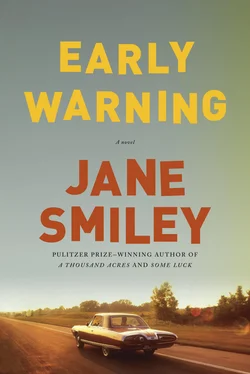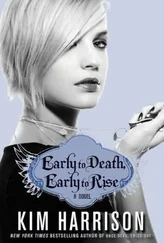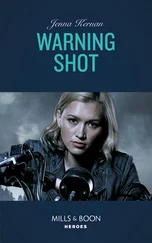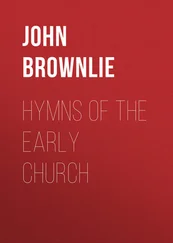Jane Smiley - Early Warning
Здесь есть возможность читать онлайн «Jane Smiley - Early Warning» весь текст электронной книги совершенно бесплатно (целиком полную версию без сокращений). В некоторых случаях можно слушать аудио, скачать через торрент в формате fb2 и присутствует краткое содержание. Год выпуска: 2015, Издательство: Knopf, Жанр: Современная проза, на английском языке. Описание произведения, (предисловие) а так же отзывы посетителей доступны на портале библиотеки ЛибКат.
- Название:Early Warning
- Автор:
- Издательство:Knopf
- Жанр:
- Год:2015
- ISBN:нет данных
- Рейтинг книги:5 / 5. Голосов: 1
-
Избранное:Добавить в избранное
- Отзывы:
-
Ваша оценка:
- 100
- 1
- 2
- 3
- 4
- 5
Early Warning: краткое содержание, описание и аннотация
Предлагаем к чтению аннотацию, описание, краткое содержание или предисловие (зависит от того, что написал сам автор книги «Early Warning»). Если вы не нашли необходимую информацию о книге — напишите в комментариях, мы постараемся отыскать её.
, a national best seller published to rave reviews from coast to coast.
Early Warning — читать онлайн бесплатно полную книгу (весь текст) целиком
Ниже представлен текст книги, разбитый по страницам. Система сохранения места последней прочитанной страницы, позволяет с удобством читать онлайн бесплатно книгу «Early Warning», без необходимости каждый раз заново искать на чём Вы остановились. Поставьте закладку, и сможете в любой момент перейти на страницу, на которой закончили чтение.
Интервал:
Закладка:
This did not mean she was unhappy. She had succeeded in confining Paul to a small corner of her world, mostly because, unbeknownst to everyone other than her lawyer and Paul, she had gone to the stockbroker’s office the day after Paul punched her and, with the aid of the secretary, a woman about her age, she had transferred $240,000 worth of money-market funds into a different account, which only she had access to. This account was now earning almost 20 percent, so she had plenty of dough. Part of the reason Paul was so bitter was that she had beat him to the draw. When he thought of this strategy as a way of preventing her from departing, he went to the stockbroker himself, and both he and the stockbroker were dumbfounded. The secretary had done a wonderful job, Claire thought, of being unable to imagine why she should have been at all suspicious or failed to cooperate with Mrs. Darnell.
Her apartment was very nice. And her car was running beautifully. Paul had trained her to adopt a strict maintenance schedule for every single aspect of her life, from hair to transmission, no matter how she felt, and it worked just the way he said it would, giving her something to do and preventing unforeseen breakdowns of every kind. She was forty-two now. Same age as Ali MacGraw, Lily Tomlin, and Tina Turner. Sometimes she decided that, while their careers were ending, peaking, or over, hers was just beginning. Other times, she envied them, that they had known what their careers were going to be, whereas she did not. Still did not.
On Tuesdays and Thursdays, she picked the boys up at school, took them to their after-school classes (Gray took German, Brad took Latin and driving). Then she took them out to eat and back to Paul’s, where she oversaw their homework. When Paul came in the back door, she went out the front door. At sixteen and thirteen, the boys, she thought, were old enough to stay by themselves, especially since they were both taller than she was, and Gray outweighed her by twenty pounds, but Paul most assuredly did not agree. On Saturdays, Paul dropped them at the skating rink at nine, and Claire picked them up at noon. In the afternoon, she dropped them at a movie or took them shopping, then out to supper again, then she dropped them at home unless Paul had a date, in which case she went in the front door while he went out the back door, and she stayed until he returned (always before midnight). Paul would not allow them to come to her apartment downtown, or even to know the address (which seemed especially absurd, given how old they were). It might have been uncomfortable if they were girls, or if they were not the sons of Dr. Paul Darnell, but following protocol had been so drilled into them over the years that protocols were comfortable if laid out carefully in advance. They were also not in the habit of asking questions, at least of her. She did not know what they asked their father. She was sure that, whatever it was, he lied through his teeth in response.
It was surprising even to her how much she hated him. She had not hated him while they were married, or even after he punched her. She had sympathized with him, recognized that he was doing his best, understood the burden his own childhood placed upon him. She had seen his frustration and his fear. She had glided from day to day, giving him exactly what he asked of her, no more, no less, and agreeing with him that this was a virtue. But after she moved out, and without apparent relationship to his actions, she had come to feel such an aversion to everything about him, from the way he said certain words — like “and” or “drawer”—to the distribution of gray hairs over his temples, to the brown spot in the blue iris of his left eye, that she was amazed at herself. When she chatted with her divorced friends at the gym (there were two of them), she had nothing to say about the odor of his feet or his table manners or his drinking habits. This was how she knew that, compared with them, she really hated him — it was as if for twenty-two years she had been cataloguing the details of her antipathy every time he told her to pay attention. The same traits, when they appeared in the boys, did not bother her, though. Paul was a system unto himself, and it was the system she scorned. Her lawyer said that she should cultivate indifference, but it was hard to do so, because Paul wouldn’t let her divorce him.
She had written him a letter — very cajoling in tone — in which she asked him what he imagined their future together would be, since she could not voluntarily return. His letter came back within the week. After the usual passages about marriage as a contract and a sacrament and an obligation, he had continued: “I still can’t believe that you meant to do this. It strikes me as some sort of enormous mistake, or cosmic joke that will soon be set right. I sensed nothing. It’s like I woke up in a different world. If you do not come to your senses, then I feel that I have to accept that I was crazy then, or I am crazy now, one or the other.” Claire could see this, black flashing to white, white flashing to black — her own feeling of sympathy, if not love, converting to antipathy, likewise, his assurance that he knew what was what converting to disorientation. But it had been a year and a half. There was a kind of willfulness to his continuing disbelief that made her hate him more.
Andy thought she should see a psychiatrist, Lois thought she should open a shop, Minnie thought she should travel, Lillian thought she should keep a journal, Henry thought she should go back to school, and Joe said they had plenty of room at the farm, obviously thinking that she might easily find herself homeless in the big world. Someone somewhere, she was sure, thought she should join a convent. The only advice she had taken was keeping a journal. She bought herself an old-fashioned sales log for a business, and wrote about objects, like her set of dry measuring cups that she had gotten for her wedding from some aunt of Paul’s whom she never met. There were also four gold-rimmed dessert plates with portraits of fruit that she had never used. She wrote down whatever came to mind about these items, maybe for a page, and then put the book on the shelf next to the toilet. Sometimes she wrote while on the toilet, which gave her a certain satisfaction. She imagined her brain as space like a cave, not very large but expandable — each word she wrote (and her handwriting was quite neat) worked in there like a tiny finger, pushing some edge, some membrane, a little further back, opening up the space and letting light in. Sometimes she wrote down the question “What next?”
But she could never answer it with anything more profound than “grilled cheese” or “a bath” or “Cosmos,” which was a book she was reading about two pages at a time. She had bought a bunch of bestsellers, including Shelley Winters’s autobiography. Shelley Winters was sixty-one. Another book she bought was about investing, Crisis Investing: Opportunities and Profits in the Coming Great Depression. According to this book, she was supposed to take her money out of the money market and put it in gold, which was these days always between $475 and $500 an ounce; this would give her about thirty pounds of gold, but no income. She thought this was an investment that would strongly appeal to Dr. Paul Darnell, but it didn’t appeal to her. However, she did write a little section in her journal about her wedding ring, which she now kept on a string hanging from the window latch. Writing about it gave her a pleasant sense of understanding gold, even of possessing it, which was close enough to buying some for now.
—
LILLIAN HAD BEEN SITTING quietly in a corner. She’d never been to this house before, an imposing Colonial on Q Street, and the party was a large one. She had been admiring the paintings, which were realistic, but strange — a donkey standing in a kitchen, a toddler sitting on the crest of a slate roof, holding an apple. When the woman sat down, Lillian struggled to remember her name — Irene — and smiled in her usual friendly way. Irene started in immediately. She leaned toward Lillian and said, “Oh, darling. I have been thinking about you. You’ll never guess what happened to me.”
Читать дальшеИнтервал:
Закладка:
Похожие книги на «Early Warning»
Представляем Вашему вниманию похожие книги на «Early Warning» списком для выбора. Мы отобрали схожую по названию и смыслу литературу в надежде предоставить читателям больше вариантов отыскать новые, интересные, ещё непрочитанные произведения.
Обсуждение, отзывы о книге «Early Warning» и просто собственные мнения читателей. Оставьте ваши комментарии, напишите, что Вы думаете о произведении, его смысле или главных героях. Укажите что конкретно понравилось, а что нет, и почему Вы так считаете.











